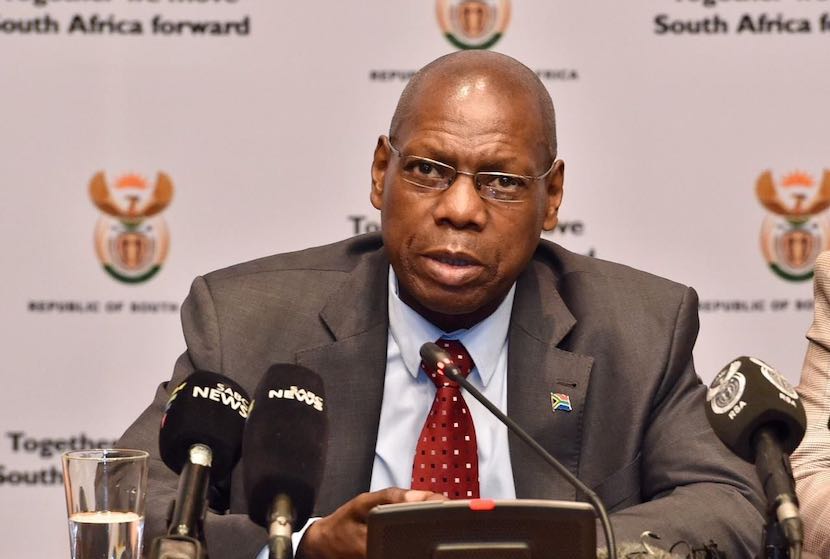
A few hours before he made the announcement that South Africa would receive its first million vaccine doses in January, Minister of Health Zweli Mkhize took Parliament through the considerations around the vaccine rollout. What’s clear is the scale of the task.
Forty million people to be vaccinated over 12 months – 6,300 full-time vaccinators, injecting up to 50 people per day.
These were some of the numbers provided to Parliament’s health committee by health minister Zweli Mkhize on Thursday.
“The only measure of protection [against Covid-19] is going to come from the vaccination programme,” Mkhize told Parliament, with a minimum of 67% of the South African population needing to receive a Covid-19 vaccine in order for the cycle of transmission to be broken.
At the time when Mkhize was addressing the portfolio committee, the question of where these vaccines would come from was still unanswered and causing considerable anxiety to the MPs present.
It was only at the tail-end of the meeting that Mkhize was able to announce that South Africa would be receiving one million doses of the AstraZeneca vaccine in January from the Serum Institute of India, which is manufacturing the vaccine. A further 500,000 doses will be forthcoming in February.
Mkhize apologised for not being able to disclose this arrangement earlier, saying that the government had been in talks “fine-tuning and aligning all the regulatory processes to make sure no unnecessary delays or regulatory impediments” would be an obstacle. South Africa’s regulatory authority, SAHPRA, will in this instance be relying on the approval already granted to the AstraZeneca vaccine by health authorities in the west.
The health department estimates that there are 1.25 million healthcare workers in the country, who will be first in line to receive these doses as Phase 1 of the vaccine rollout. Phase 2 will encompass those who are over 60 years old or have comorbidities, and Phase 3 will see other adults over the age of 18 receive the jabs.
- Chamisa under fire over US$120K donation
- Mavhunga puts DeMbare into Chibuku quarterfinals
- Pension funds bet on Cabora Bassa oilfields
- Councils defy govt fire tender directive
Keep Reading
Mkhize acknowledged that there are still issues to be resolved. It’s unclear whether the vaccines are safe for pregnant women, for instance, so they will not be included in rollout plans at first. It is also not known whether it is necessary for people who have already been infected with coronavirus to be injected.
“That issue is being worked on,” Mkhize said.
But the primary question remains where the rest of the vaccine doses will come from, with another 38.5 million needed in order to achieve South African herd immunity.
Mkhize said that South Africa is expecting to receive its Covax allocation of vaccines in April and that discussions with vaccine manufacturers are at a “quite sensitive” stage.
Deputy director-general of health Anban Pillay appeared to suggest to Parliament that a deal was nearing completion with drug company Johnson & Johnson. He described discussions with the company as “fruitful”, and added that he hoped “we will be able to confirm details later”.
The health minister stressed that the government would be the sole buyer of vaccines – contradicting reports that, for instance, the Western Cape was planning to enter into its own negotiations.
“Manufacturing companies would rather deal with governments,” Mkhize said.
He implied that this direct bilateral aspect would also cut down on the possibility of corruption. The problem with the PPE procurement was that “there were many vendors to procure from”, Mkhize said.
“This [vaccine procurement] is quite direct between government and manufacturers,” he said.
Although the Treasury is going to carry the “major burden” of procuring the vaccine, Mkhize said that two other financing measures will be investigated: asking private medical schemes to cross-subsidise the vaccines and asking donors and business to make contributions.
With regard to the second surge of Covid-19 in South Africa, Mkhize reported to Parliament that there is a huge demand for hospital beds and oxygen, necessitating the “reactivation” of beds that had previously been decommissioned.
In provinces such as the Eastern Cape and the Western Cape, infection numbers have now exceeded what they were at the peak of the first wave in 2020, while in KwaZulu-Natal almost twice the number of patients are being admitted to hospital as in 2020. – Daily Maverick











